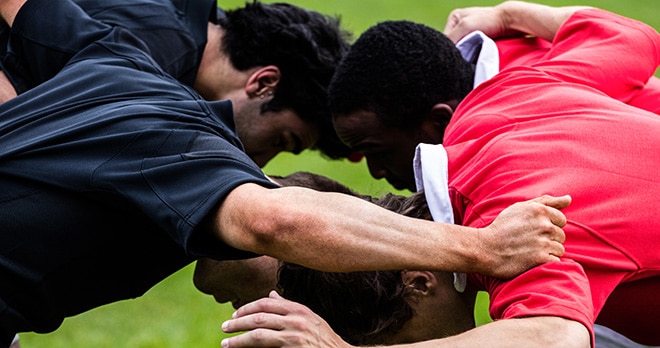Head injuries in rugby – what are the signs, and should more be done to avoid them?

It is important that everyone involved in rugby, whether on or off the pitch, knows the signs to look out for during both training and matches.
If a player has suspected concussion at any time then they:
- should be removed from the field. They should never continue to play.
- must not be left alone
- must not drive a vehicle
- must always be in the care of a responsible adult, who is informed of the player’s suspected concussion
- should be medically assessed as soon as possible.
In the event of a suspected concussion it is important that someone remains with them for at least 24/48 hours afterwards. Whilst the signs and symptoms of concussion usually start at the time of the injury, the onset of these may be delayed. All parents, family members and friends should therefore also know the signs to look out for.
The signs someone has a concussion
If a player has any of the signs and symptoms listed below they must be immediately removed from activity and must not return. And it’s worth remembering that some symptoms are more obvious than others (please note this list is not exhaustive).
A player with a concussion may experience:
- loss of consciousness
- seizure or convulsion
- balance problems
- nausea ‘(feeling sick) or vomiting
- drowsiness
- mood swings
- irritability
- sadness
- fatigue or low energy
- a sense of nervousness or anxiety
- confusion
- they “Don’t feel right”
- headache
- dizziness
- feeling slowed down
- “pressure in head”
- blurred vision
- sensitivity to light
- amnesia
- a feeling like they are “in a fog”
You should never ignore the signs and symptoms of concussion as they may:
- result in death,
- result in a more serious brain injury
- result in a prolonged recovery period.
The potential for a serious and prolonged injury emphasises the need for comprehensive medical assessment and follow-up until the concussion has fully resolved.
What can be done to avoid these injuries?
There has been a lot of discussion around the area of brain injury in recent years, particularly in light of the many high profile players regularly taken off the pitch. Only in July this year 14-year-old Evan Hawksworth died after suffering a brain injury playing rugby.
The high risk of injury in rugby is due to the collisions that are all part of the game. Obviously, the main problem area is the tackle which is said to account for between 39.6% and 64.0% of all injuries sustained by children during rugby.
There are three ways that the risk of head injury could be reduced in young people right now:
- increasing education around concussion, its causes and symptoms
- making education of young people on the risks of concussion compulsory
- revising the rules of contact sports to prevent unnecessary concussion risks.
However, questions around these measures continue to be debated and as yet no definitive action is being taken. All the while concussion injuries continue to be a problem in rugby.
If you are at all concerned about a suspected concussion or head injury and need advice, then there are many organisations that can assist including the brain injury charity Headway.